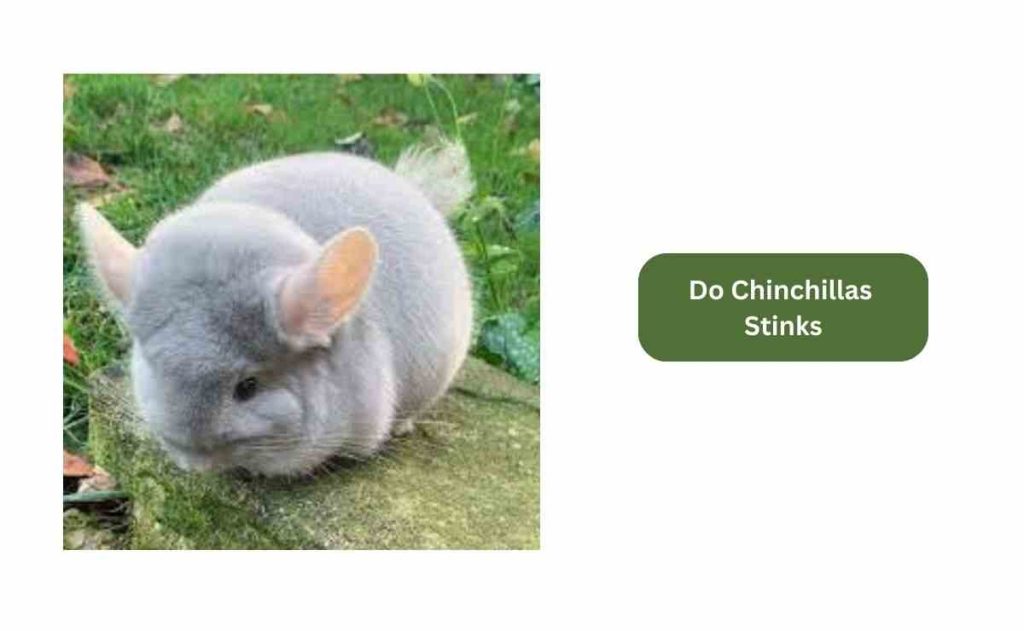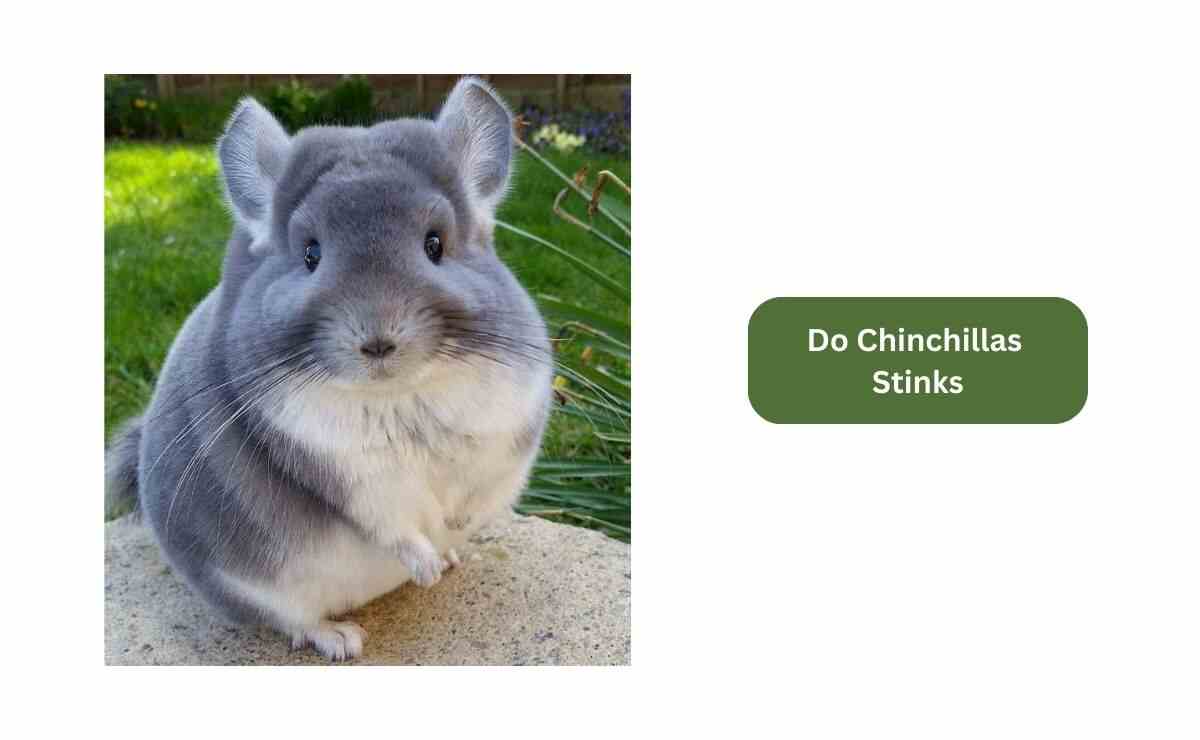Chinchillas are the most adorable type of rodents for pets. But before owning a pet, many owners consider: do chinchillas stink?
Well, chinchillas are quite odor-free. They are less stinky than other pets. If they are properly hygienic and the cage is clean, you nearly won’t get any odor. They clean themselves through dust baths.
However, chinchillas can develop odor due to various health issues. In this case, you need to take them to a vet. Also, if you don’t clean the cage, their poop, pee, and bacterial smells. By the way, this can be handled easily.
Do Chinchillas Stink?

Chinchillas are naturally clean animals and under normal circumstances, they don’t stink. At least, not like other pets. They use dust baths to maintain their fur’s cleanliness. Dust bath helps to remove excess oils and dirt from their body. This self-grooming behavior prevents them from developing musky odors.
Furthermore, chinchillas generally eat hay, which is dry and doesn’t go bad easily. This dry diet, along with infrequent urination doesn’t develop strong odors in their urine and feces.
However, chinchillas and their cage can have unusual smells due to illness or hygiene issues. Otherwise, they are very clean animals. But whenever you notice any smell, it can indicate serious issues.
Why Does My Chinchilla Stink?
Though chinchillas don’t smell, there are a handful of reasons that cause chinchillas to smell bad. For example
1. Dental Issues
Chinchillas’ teeth grow continuously throughout their life. So dental issues can be obvious if properly not cared for. crooked teeth, or uneven wear. When these problems occur, they can lead to pain, discomfort, and an odor.
A bad smell coming from your chinchilla’s mouth is a clear indicator of dental issues. Fur matting down the chest may occur if overgrown teeth pierce the tongue or cheeks. Also, dental problems can cause mouth abscesses and ulcers that cause excessive drooling.
Just like humans, chinchillas need regular dental check-ups to ensure their teeth are in good condition. If you notice any of the symptoms mentioned above or if your chinchilla’s eating habits change, consult a veterinarian who specializes in exotic pets immediately.
To avoid odor and discomfort for your chinchilla, you need to ensure proper treatment. Moreover, chinchillas can benefit from chew toys that wear down their teeth naturally. Chewing hay also helps wear down their teeth naturally and prevent overgrowth.
2. Dirty Cage
We know that chinchillas are odor-free until there is no illness. But if their cage is dirty and not cleaned regularly, they will stink. Maintaining a clean cage is important to keep your chinchilla odor-free and comfortable.
Simply removing poop won’t eliminate odors entirely, their poor doesn’t smell. But it’s not that mean you don’t clean. You must as Chinchillas poop a lot.
It’s also necessary to clean the entire cage, including bedding, toys, and accessories. Chinchillas tend to explore their cages, so dirt and debris can pile up around the cage.
Don’t forget the bedding. You need to clean or replace it to maintain hygiene. Opting for fleece liners as bedding is an excellent choice. Fleece liners are not only comfortable for your chinchilla but also easy to clean.
Ensure proper ventilation in the room. In order to dispel lingering odors, adequate airflow is necessary. Don’t forget to clean and sanitize toys and accessories regularly. These items can accumulate dirt and contribute to odors if left uncleaned.
3. Wet Hay
If you don’t manage your chinchilla’s hay, it can make the cage smell. The hay shouldn’t smell bad as it’s dried grass. Hay can be preserved for years if it is dry. But if it gets wet, it will stink.
Chinchillas are quite messy while eating. They pick one piece of hay, eat a little bit, leave it, and take another fresh hay. Thus, the floor is covered with old and fresh hay. If the cage is dry, the hay will also dry. But if they pee on it, hay gets wet and bacteria and mold start to grow, making it stinky.
Does Chinchilla Pee Smell?
A chinchilla’s urine itself doesn’t have a strong odor when first excreted. However, if you don’t clean it often and leave it to sit for a while, it can develop a bad smell. It’s like an ammonia smell, just like other dirty rodent cages.
To prevent urine-related odors, it needs to maintain a clean cage. Daily spot cleaning is crucial. A weekly deep cleaning, which includes changing the bedding and disinfecting the cage, helps ensure a fresh living environment.
Litter training is a beneficial practice for maintaining a clean and odor-free cage environment. If you don’t provide a litter box, your chinchilla will typically choose one corner of the cage for urination.
So you need to give a litter box, place it in a corner of the cage, and train your chinchilla to urinate on that spot. But it may take some time and patience. You can use shredded newspaper or a specialized chinchilla-safe litter box. Avoid using clumping cat litter or any materials that are harmful to chinchillas.
Keeping the litter box clean is also necessary to avoid odor. Remove soiled litter daily and replace it with fresh litter.
Does Chinchilla Poop Smell Bad?
Chinchilla poop typically doesn’t have a strong odor when they are in a healthy state. Their feces are typically hard and dry and don’t emit unpleasant smells. But if your chinchilla has gastrointestinal issues or diarrhea, their feces can become softer and smell like typical animal poop.
Also, if you don’t clean the cage or litter for an extended period, bacteria can break down the poop, leading to an unpleasant odor. In some cases, strong odors from chinchilla feces could indicate serious health issues. If you notice a persistent foul smell, consult a veterinarian for a thorough examination.
Do Dust Baths Prevent Chinchilla From Smelling?
If your chinchilla is healthy and the cage is clean, they will not stink without a dust bath. Still, dust baths are necessary to take care of their soft fur. A wet bath won’t help for your chinchilla.
Chinchillas have incredibly dense and soft fur. For their comfort, you need to give them a dust bath. It’s a natural process to clean their fur. It is also helpful to prevent any chance of odors developing on a chinchilla’s fur.
The fine dust particles absorb and remove oils and moisture, leaving the fur clean and fresh. Regular dust baths can also prevent fur issues, such as matting and tangling, which can occur if the fur becomes dirty or oily.
Your chinchilla can take a dust bath three times a week. It’s a good practice. This frequency helps ensure their fur remains in excellent condition without overdoing it.
Conclusion
Chinchillas don’t smell strongly if they are healthy. But if you don’t maintain them and don’t clean the cage regularly, chinchillas will stink.
However, maintaining a clean environment for them is key to keeping them odor-free and healthy. Regular cleaning routines like daily spot cleaning and weekly deep cleaning, help prevent the buildup of odors. Selecting chinchilla-safe bedding materials, providing a litter box, and monitoring their diet and health are essential steps to avoid odor.
